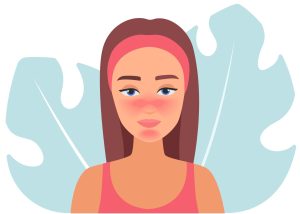According to the American Academy of Dermatology Association, Rosacea is a common skin disease that often begins with a tendency to blush or a flushing appearance, more quickly than other people. The U.S. Government reported that more than 14 million people live with rosacea. These figures include those between the ages of 30-50 (including men, women, and people of color). Children also may develop rosacea.
Although researchers are still trying to answer this question, stress may cause these flare-ups. Emotions are powerful forces in our bodies that affect our mood, health, physical appearance, and energy.

Quick Summary of Key Information:
- Rosacea Overview:
- Chronic skin condition commonly appearing as redness, bumps, or visible blood vessels.
- Affects adults, primarily between ages 30 and 50, with varying degrees of severity.
- Stress and Rosacea:
- Stress activates hormones that increase inflammation, blood flow to the skin, and sensitivity.
- Proven to aggravate rosacea symptoms and lead to more frequent flare-ups.
- Key Triggers of Rosacea:
- Stress, sun exposure, temperature extremes, spicy foods, and alcohol.
- Impact levels vary per individual (see trigger comparison table below).
- Practical Stress Management:
- Adopt mindfulness practices like meditation or yoga.
- Maintain a balanced diet and establish a consistent routine.
- Seek professional dermatological care for personalized treatment plans.
- FAQs:
- Stress doesn’t cause rosacea but can significantly worsen symptoms.
- Strategies like deep breathing or non-irritating skincare help reduce flare-ups.
Discover how stress impacts rosacea and learn actionable steps to manage your symptoms effectively.
What Is Rosacea?
Rosacea is a long-term skin condition often characterized by persistent facial redness. Commonly mistaken for acne or sunburn, rosacea can develop into more distinct symptoms over time, including small bumps, burning sensations, or visible blood vessels.
 Key Symptoms:
Key Symptoms:
- Redness in the face (especially around the nose, cheeks, or forehead)
- Swollen, sensitive skin
- Acne-like breakouts without blackheads
- Eye irritation (known as ocular rosacea), experienced by some individuals
- Thickened or rough skin in advanced cases
Rosacea impacts both physical and emotional well-being. Many people report feeling self-conscious and avoid social situations during flare-ups. Identifying triggers and managing them holistically—including tackling stress—is an essential part of care.
Can Stress Make Rosacea Worse?
The Cortisol Connection
When you experience stress, your body releases cortisol, often referred to as the stress hormone. At normal levels, cortisol helps your body respond to challenges. However, chronic stress can lead to a range of issues, especially for those with rosacea:
- Cortisol increases blood flow to the surface of the skin, intensifying redness and swelling.
- It can impact your immune system, making you more prone to skin irritation and delayed healing.
- Stress may disrupt your body’s ability to regulate inflammation, a key factor in rosacea symptoms.
Research Supports the Stress Trigger
Clinical studies and patient surveys consistently show that emotional and psychological stress exacerbate rosacea in many individuals. Dermatologists often emphasize stress management as part of rosacea treatment plans, underscoring its importance in minimizing flare-ups.
Key Highlights:
- Increased stress correlates with vascular dilation, one of rosacea’s primary symptoms.
- Studies show rosacea patients report more frequent flare-ups during work stress, family conflicts, or financial challenges.
- Effective stress reduction techniques have been linked to better-controlled rosacea symptoms.
Managing stress allows rosacea sufferers to regain some control over their skin’s unpredictability, lowering the frequency and severity of outbreaks.
Common Rosacea Triggers and Their Impacts

Different individuals respond uniquely to rosacea triggers. Understanding these factors can help tailor lifestyle adjustments.
| Trigger | Impact Level | Notes |
| Stress | High to Moderate | Fluctuates with emotional well-being. |
| Sunlight | High | Use sunscreen daily as a preventive step. |
| Spicy Foods | Moderate | Map personal dietary effects over time. |
| Alcohol (e.g., red wine) | High | Particularly associated with vasodilation. |
| Temperature Extremes | High | Both high heat and freezing cold worsen symptoms. |
Understanding your own patterns and working to manage controllable triggers is key to better symptom control.
Stress, Spicy Foods and Alcohol
Stress manifests as emotion and triggers rosacea flare-ups as quickly as spicy foods and alcohol. Excessive stress can cause the body to overreact, causing dramatic chemical and physical changes. People under severe stress may gain or lose weight, break out in hives or pimples, or in some instances, lose their hair. Still, for those with rosacea, physical anxiety symptoms may include flare-ups because rosacea links to abnormal chemical reactions in the skin.
According to a survey conducted by the National Rosacea Society, stress management can reduce its impact. The results share that 91 percent of 700 rosacea patients reported that emotional stress sometimes caused their rosacea to flare up. Patients’ most challenging emotional stress regarding their rosacea was anxiety, followed by anger, frustration, worry, and embarrassment.

Controlling stress is about locating its cause. If you experience a rosacea flare-up, try journaling how you feel. After a few weeks, you will discover a pattern of your outbreaks and their triggers. After identifying the triggers, you can avoid the triggers and focus on your healthy habits which influence our bodies’ functioning and skin. Just like the health benefits of breathing and exercising, reducing the physical effects of stress is just as important.
If you cannot identify the stress, you can determine what relaxes you.
Whether it is reading a book, taking a walk, or having conversations with friends, and taking these steps to inspire a healthier lifestyle can affect your overall skin appearance.

Tips for Managing Stress and Rosacea
Managing stress not only benefits your mental health but can also improve rosacea symptoms. Below are practical steps to help reduce daily stress and take care of your skin:
1. Practice Mindfulness
- Dedicate 10–15 minutes a day to relaxation techniques like meditation or breathing exercises.
- Apps like Calm or Headspace can guide beginners into mindfulness.
2. Build a Healthy Routine
- Aim for 7–8 hours of quality sleep nightly.
- Create consistent, manageable schedules for meals and daily tasks to reduce anxiety.
3. Focus on Nutrition
- Include anti-inflammatory foods, such as leafy greens, berries, and omega-3-rich fish.
- Limit heavily spiced, caffeinated, or alcoholic beverages that exacerbate symptoms.
4. Include Low-Impact Exercise
- Gentle yoga, walking, or swimming supports circulation without triggering flare-ups.
5. Use Quality Dermatological Products
- Stick to fragrance-free cleansers and moisturizers recommended by your dermatologist.
- Always wear sunscreen with SPF 30 or higher to protect against UV-related triggers.
6. Seek Professional Help
- Consult with therapists for practical stress management strategies tailored to your daily life.
- Schedule regular visits with your dermatologist to align skincare with updated needs.
 Moving Forward with Confidence
Moving Forward with Confidence
Stress may not cause rosacea outright, but it is a powerful trigger for many individuals. By recognizing this connection and taking actionable steps, you can minimize flare-ups and feel more in control. Combine stress management strategies with professional skin care tailored to your condition for the best outcomes.
At Associated Dermatologists, our mission is to empower you with compassionate care and evidence-based solutions. Whether you’re facing stress-related flare-ups or other complex skin concerns, we’re here to help. Contact us today to discover a personalized approach to rosacea management and healthier, glowing skin.
FAQs About Stress and Rosacea
Does stress alone cause rosacea?
No, stress doesn’t directly cause the condition, but it can significantly worsen symptoms and trigger flare-ups. The primary contributors include genetics, environmental factors, and skin sensitivity. Stress often exacerbates these underlying factors, leading to more noticeable and persistent symptoms over time. Managing stress, alongside addressing these core causes, can help reduce the severity of symptoms.
How do I know if stress is affecting my flare-ups?
If you notice worsening redness or other symptoms during stressful events, such as an approaching work deadline, a major life change, or even daily pressures, stress might be a trigger for your condition. Stress can intensify underlying issues and make symptoms more noticeable or severe. Keeping a detailed symptom journal, where you note triggers, the timing of flare-ups, and the severity of symptoms, can help you identify patterns and correlations over time. This awareness can play a key role in managing your symptoms more effectively.
What can I do to quickly ease stress-related symptoms?
Taking deep breaths, drinking plenty of water, and using dermatologist-approved soothing skincare products can help provide temporary relief for irritated skin. Deep breathing can reduce stress, which is often a trigger for skin issues, while staying hydrated supports your skin’s natural healing process. Applying gentle, calming products with ingredients like aloe vera or chamomile can help reduce redness and discomfort. Be sure to avoid over-handling or touching your skin, as this can introduce bacteria or cause additional irritation, potentially worsening flare-ups. Treat your skin gently and allow it time to recover.
Is managing stress critical in rosacea treatment?
Yes! Stress reduction plays a crucial role in improving many patients’ ability to manage their symptoms more effectively. High levels of stress can worsen conditions or hinder treatment progress, making it harder for the body to heal. When combined with medications, lifestyle changes such as a healthy diet and regular exercise, and techniques like mindfulness or therapy, stress management can lead to significant and lasting benefits for overall health and well-being.
Can self-care really make a difference?
Absolutely. From getting a full night of restful sleep to using gentle, nourishing skincare products, small daily improvements can make a big difference. These habits not only promote relaxation and recovery but also help reduce the overall stress burden on both your mind and skin, leaving you feeling and looking healthier over time.

